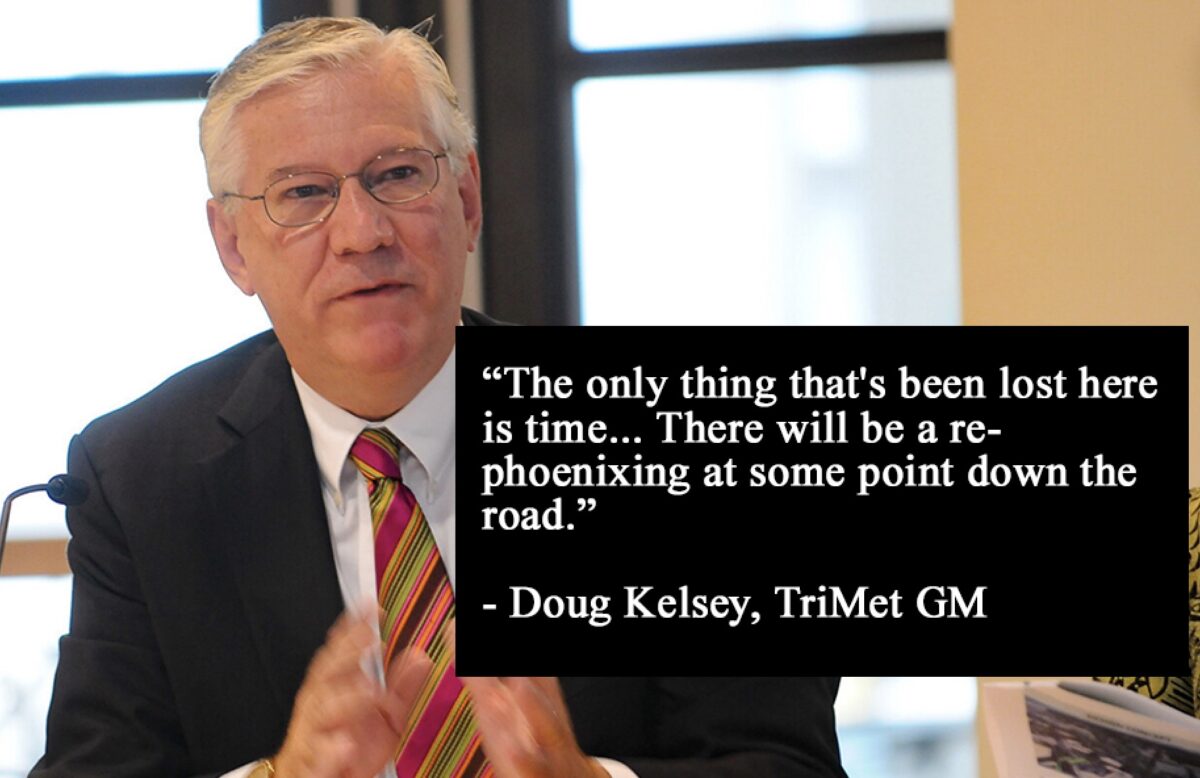
This morning TriMet General Manager Doug Kelsey had the unenviable task of hosting the final meeting of the SW Corridor Light Rail Project Steering Committee. The project was set to receive $975 million from the Metro funding measure that failed at the ballot box on November 3rd. Without the money, there’s no path forward for the project and officials say it will be put to bed until further notice.
The steering committee is made up of elected officials from around the region. It includes: the mayors of Durham and Tigard; a councilor from Metro Tualatin and Portland; ODOT’s regional rep, and a Washington County Commissioner. Their mood was much less solemn than volunteers from the Community Advisory Committee who we reported on last week. Electeds are by nature more desensitized to disappointments and they’re also experts at putting a positive spin on bad news.
Kelsey (who ironically came to TriMet in 2015 from British Columbia’s TransLink after he was let go following a resounding “no” vote on an unpopular transit funding measure) told the seven members of the committee that without the Metro measure funding, “There’s just no plausible way for us to move forward.” “On the TriMet side of things… we’ll move to a wind-down period for the foreseeable future.”
Then Kelsey uttered a word I’d never heard used in this context before, but that would be used several times in this meeting: “re-phoenixing”, a reference to the mythological ancient Greek bird that rises back to life out of burnt ashes. “There will be a re-phoenixing at some point down the road, because the demand still exists.” Kelsey said. He and several other committee members blamed the timing of the measure and economic conditions surrounding the pandemic as the major culprits for its loss.
No one in the meeting had anything bad to say about the project itself.
Advertisement

Kelsey’s remarks sounded like a post-game speech from a kind-hearted football coach trying to lift his team’s spirits after they lost to an underdog in front of a big home crowd. “There’s no question,” Kelsey continued, “The Southwest Corridor is a great project. It was one of the biggest contributors to reducing greenhouse gas in this region could actually have undertaken on its own. So I don’t want us to lose sight of the good that comes out of the challenge of having a setback. The only thing that’s been lost here is time. And so we will have a chance to re-emerge sometime down the road.”
Kelsey then likened the project to the ill-fated Columbia River Crossing — another multi-billion dollar mega-project years in the making that failed to win popular support and ultimately died when Washington legislators refused to fund it. CRC backers have changed the name of the project and kicked off a new planning process earlier this month. “Like the CRC project up to the north,” Kelsey said of the SW Corridor, “It is now re-phoenixing itself… This will have that time as well.”
Consultants and agency staff made $175 million planning the CRC. At this morning’s meeting, Kelsey said the public, “Should all be really proud of what their taxpayer dollars have done.”
We had about three days of feeling a little sorry for ourselves and are back to figuring out what’s next.”
— Tyler Frisbee, Metro federal affairs policy manager
TriMet still plans to complete the project’s Federal Environmental Impact Statement (FEIS) so that it’s as shovel-ready as possible for any funding opportunities that might arise. With hopes of a big infrastructure program from the Biden administration, Kelsey said he’s already contacted LA Metro CEO Phil Washington who’s been named as a member of Biden’s transportation policy advisory team.
Metro’s Federal Affairs Policy Manager Tyler Frisbee spent three years crafting the funding measure. At this morning’s meeting she called the loss a mere “bump in the road.” “We had about three days of feeling a little sorry for ourselves and are back to figuring out what’s next.”
SW Corridor Project Director Leah Robbins said much of the work from the design and planning teams can still be put to use. “Things related to the stormwater challenges in the corridor and things that are related to safer ways to bike and walk,” are still relevant she said.
Other officials also looked to put a positive spin on the news.
Washington County Commissioner Roy Rogers said the loss is just a “very minor setback in the big scope of things.” “I’m not disheartened by this part of the process,” Rogers said. “Because you can take two or three steps forward, than four or five steps back — and you can achieve things by doing that.”
Durham Mayor Gerry Schirado and City of Tualatin Councilor Robert Kellogg both blamed the timing of the vote and the pandemic for the measure’s loss. “It could not have been more catastrophic,” Schirado said. And Kellogg said he remains hopeful. “Once it is built, I very much look forward to the many comments wondering why the line was not built earlier.”
Kelsey smiled widely upon hearing that comment. In his mind the goal of the project — its “north star” — remains unchanged: “We are committed to going to Bridgeport [a big shopping mall in Tigard]. We must be resolute in that from a regional perspective.”
— Jonathan Maus: (503) 706-8804, @jonathan_maus on Twitter and jonathan@bikeportland.org
— Get our headlines delivered to your inbox.
— Support this independent community media outlet with a one-time contribution or monthly subscription.

